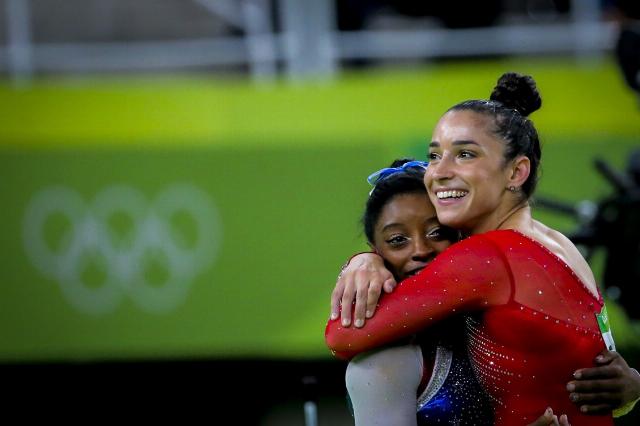Hug hypocrisy at the Olympic Games
It’s refreshing to see a bit of camaraderie at the Olympics, but only where appropriate, otherwise it becomes meaningless. Obliging the Olympic values is welcome, but compulsory hugging can contribute to the anxiety that ravishes some Olympians.
After a grueling marathon or triathlon, the finishers often embrace one another, even as they collapse to the ground, utterly exhausted. That’s reasonable -- they just endured physical challenges testing the limits of human endurance, perhaps urging each other along the excruciating race. Maybe they even train together, and have formed a bond.
Swimmers, particularly those who place in the medals, often embrace before exiting the pool. Again, there is an esprit de corps and mutual respect as they travel the swimming circuit together.
But what’s with all the exuberant hugging in gymnastics, skateboarding, diving, and track and field? Some of it (not all), reeks of hypocrisy.
Some of the gymnasts seem on the cusp of madness as they engage in hug hypocrisy. For example: after “vaulting” into medal contention, gymnast “A” nervously glares at the scoreboard as the last competitor, gymnast “B,” completes her routine. If “B” scores highly enough, “A “will be knocked out of medal contention. If that happens (they perform in reverse order of preliminary scores -- highest go last -- so it’s possible, if not likely), the upstaged gymnast invariably smiles for the cameras then runs up to hug her conqueror.
The sportsmanship is nice, up to a point, but one wonders about the sincerity. Secretly, the loser probably wanted the winner to slip, trip, or, better yet, fall off the apparatus. No wonder some of them go nuts: the utter deference to the spirit of sportsmanship can conflict with their competitive mentality. That has the makings of cognitive dissonance.
The same can be said for diving competitors. As one diver waits for another to (hopefully) splash in with a belly-flop, but will invariably hug her opponent, even while seething inside, if her twists, pike maneuvers, summersaults, and whatnot, are golden.
Naturally (and thankfully), female competitors are the biggest huggers, but that may not represent “girl power.” At skateboarding, they are constantly opening their arms to anyone who walks by. They seem to have no physical aura boundary. Sky Brown, for example, is a teenage skateboarding sensation who seemingly hasn’t met a person who is not huggable. It’s good fellowship, up to a point, but at times it appears coached, rather than spontaneous.
Certainly, the charm soon wears off during an overly exuberant hug-fest. Fortunately, they don’t fake it quite as much on the track. In some of the running events it’s obvious the hugs are perfunctory as losers seek out the winner for a quick pat, if not embrace.
Respecting the competition, and showing some compassion for the vanquished, is magnanimous. But if one hugs everyone, all the time, it becomes cringeworthy. It also detracts from the thrill of competition. To everything there is a season.
One of the most exciting races so far at the Paris Olympics was the men’s 1500 meters, featuring Norwegian Ingebrightsen and Brit Josh Kerr. They don’t care for one another, and made no bones about wanting to “destroy each other.” Thank goodness -- finally some intense competition without pretense. Their rivalry made the race so much more compelling, even as American Cole Hocker scrambled home for Gold. Rather than harbor unhealthy and conflicted feelings, they’ll probably become frenemies as their careers wind down.
There’s no pretense in the marquee 100 meter dash, either, where establishing dominance, not fellowship, adds to the excitement.
It’s known that Olympic athletes are far from superhuman when it comes to mental health. Holding two conflicting thoughts at the same time -- I must win and I must hug the winner if I lose -- can lead to cognitive dissonance. Preferably, the Olympic Games should not become a platform for obligatory hug-hypocrisy.

FOLLOW US ON
Recent Articles
- Transgender Armageddon: The Zizian Murder Spree
- Jasmine Crockett, Queen of Ghettospeak
- The Racial Content of Advertising
- Why Liberal Judges Have a Lot to Answer For
- Dismissing Evil and Denying the Holocaust — What’s the Endgame?
- The Witkoff Warning: Will Jordan’s King Fall?
- Can Trump Really Abolish the Department of Education?
- Carney’s Snap Election -- And Trump Saw It Coming
- We Can Cure Democracy, But Can We Cure Stupid?
- George Clooney: Master of Cringe
Blog Posts
- Two new revelations about the Signal leak, along with two theories
- Big Tech’s Invisible Hand: How Google and Meta manipulate our elections
- New report: Netherlands is now euthanizing minors
- Tantalizing tidbits: Five news stories about leftists, and sea lions, acting aggressively
- Rockets to Roses: Israel’s bizarre trade cycle with Aza
- Fort Knox? Gold cams!
- There is no birthright citizenship for illegal aliens
- Turn off the phone. Close the laptop.
- Nine reasons Democrats are doomed to irrelevance
- Wagner College should restore Trump’s honorary degree—and set a national example against cancel culture
- The Signal Scandal was a nothingburger, but the WSJ takes the opportunity to attack Vance
- The Trump effect: An unprecedented investment surge and economic renewal
- Hydrocarbon-friendly Trump a match for energy-hungry India
- And Big Bird can’t sing
- The DC appellate court order affrming Judge Boasberg dishonestly ignores its lack of jurisdiction






